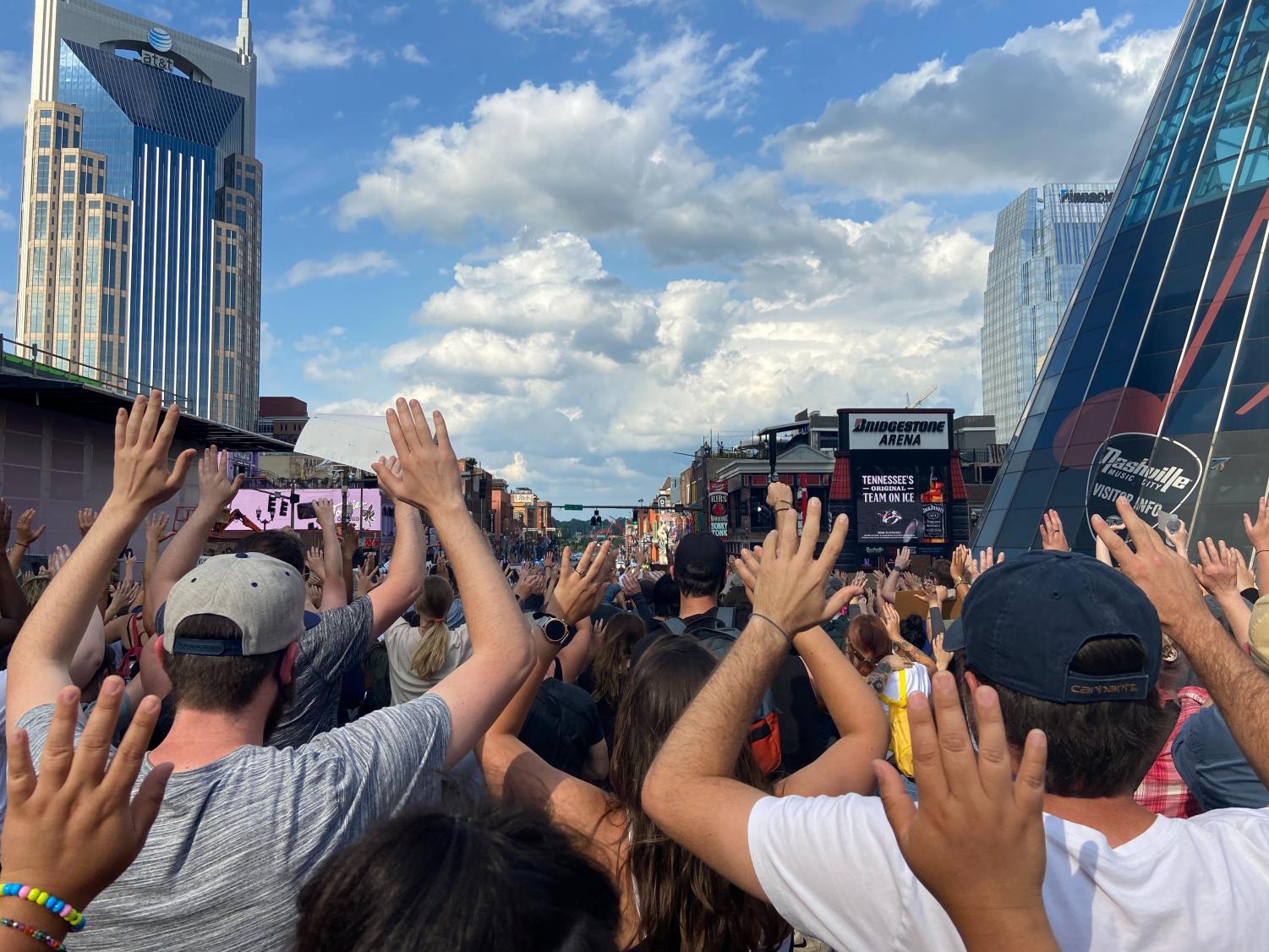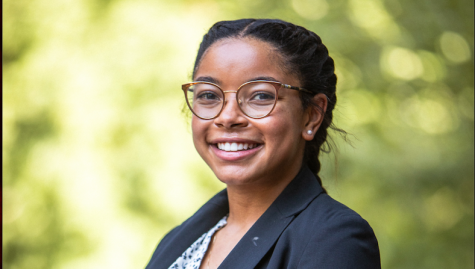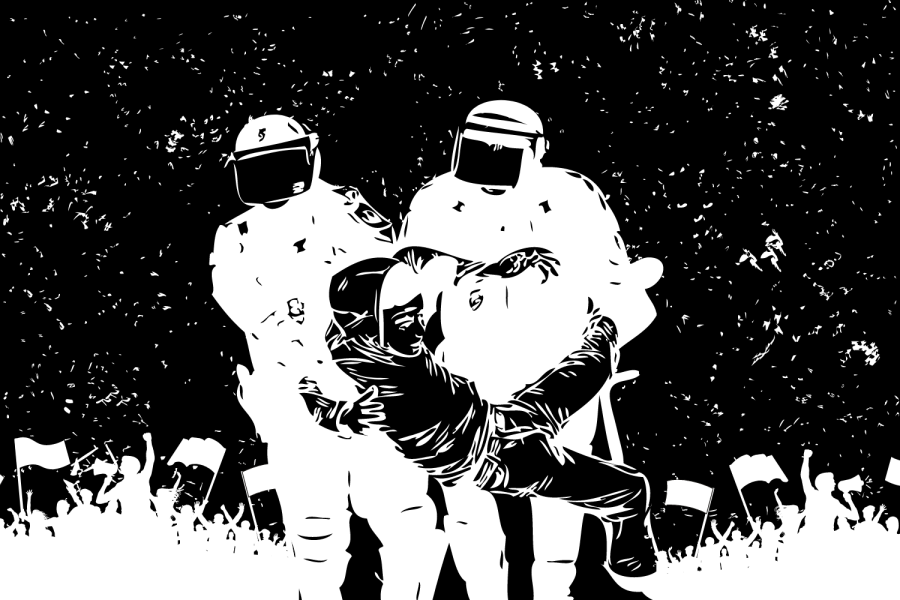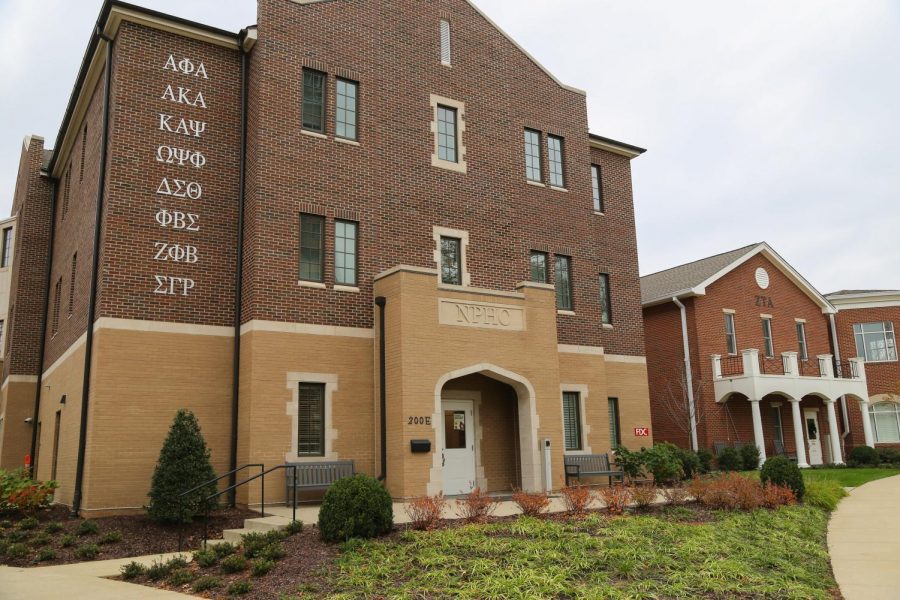
When I reflect on the events in this country that have unfolded throughout the last week, I am immediately confronted with an onslaught of feelings and emotions. I feel sadness and fear because, again, Black people must plead, beg and bleed for the powers that be to respect the rights promised to every American. I feel prideful and excited because, again, Black people refuse to accept normalized racism, flooding the streets with rallying cries for action, justice and change. I feel joyful and hopeful because people around the world continue to echo and expose the extent to which institutionalized racism has rotted America since its inception.
Every moment that I refresh my social media timelines, I see countless testimonies and videos of protestors who report the horrific actions of police who swore an oath to “protect and serve.” Yet, Black men and women are routinely denied the basic right to breathe because white supremacy exists only at the expense of Black inferiority. Today, our revolutionary Blackness fundamentally threatens the fragility of their whiteness, so they arrest us, beat us and kill us in the hope that we look the other way and remain silent. Instead, Black people and our non-Black allies have fought and will continue to fight back against the racist structures of government until they answer for their crimes.
These are my immediate thoughts on the issue, but I, like many others, have questioned how I can join the fight for justice and change. I have continued to donate, learn and protest, but I want to do more. As I have found in the past, this column has afforded me the opportunity to articulate my feelings and analyze common experiences through the lens of a student-athlete at a prominent Division I university. This new wave of the Black Lives Matter movement has once again prompted me to write about life as a student-athlete at Vanderbilt, especially as a Black female.
For the last few days, Vanderbilt’s athletic coaches and administrative leaders have published several statements, exclaiming their solidarity and support of all Black people. Many teams, including the soccer team, have also held Zoom meetings where Black members of the team had the opportunity to further explain the validity of Black history, Black struggles and Black experiences to our non-Black teammates.
The non-Black people who decided to join these open forums were refreshingly excited to learn about the dimensionality of their privilege, asking insightful questions to better themselves as allies to the Black community. In these moments, I couldn’t have been more proud to be a Commodore. After talking with peers on other Vanderbilt sports teams, however, we noticed a deafening silence from some people, specifically white teammates, who weren’t comfortable enough to participate.
While I, and other Black teammates, were slightly disappointed to find that a few of our white peers were reluctant to join the Zoom discussion, unfortunately, we weren’t entirely surprised. Around the country, white people are quick to claim and consume Black culture, praising Black athletes, models, actors and musicians for their entertainment value, yet these same white people hesitate to fight for human rights. Vanderbilt’s campus is not immune to this disheartening reality. The events of the last week have reminded me of the blatant fact that Black people are unable to quietly sit on the sidelines because society will always remind and reduce us to the color of our skin. While our non-Black teammates exercise their privilege to ignore the problem, their Black teammates and friends struggle for safety and equality within a system that depends on their subjugation. Nevertheless, I am appreciative of the open dialogue initiated by the athletic department and the first steps taken by many non-Black student-athletes who are advocates for the BLM movement. There is, however, far more room for progress.
While I am speaking directly to the white athletes of the Vanderbilt community, I am also addressing all people who want to help but don’t know how. It’s okay to feel nervous about these conversations, especially if you’re not particularly educated in issues related to race. However, change cannot happen until everyone, Black and non-Black, is willing to lean in and engage in these uncomfortable conversations. From this discomfort, we can begin to draft initiatives, goals and resources that attack the injustices that have plagued the black community generally and the Vanderbilt community specifically. Nervousness is okay, but complicit silence is not—even if you’re Black. Otherwise, your well-written texts and Instagram posts become hollow, performative declarations of inaction.
The events of this last week have catapulted us all into a new era of accountability and justice. With the tools and resources we have at our disposal, it has never been more important for the Vanderbilt population to wield our influence with unrelenting courage and action.
Many individuals and representative groups from Vanderbilt have publicly put forth their efforts towards change: Vanderbilt alumna and former Women’s Soccer captain Nia Dorsey thoughtfully harnessed the power of social media to pen her hopes for the future on Instagram. Further, Black Vanderbilt students and alumni drafted a formal letter to the administration and created a petition to hold Vanderbilt accountable for racial injustice.
Vanderbilt athletes and students alike have a unique platform to speak out and act against systemic racism. We can inspire the people around us to watch movies, read books, listen to podcasts and ask questions in an effort to educate themselves. We can urge the people around us to donate to causes at the heart of this fight, including the Black Visions Collective, Reclaim the Block, The Bail Project and many others. We can critically challenge the people around us who insist on making racist jokes and comments. In short, we can do a lot more than create random, substance-less social media posts when there are more intentional ways to use one’s social platform.
The future holds endless possibilities for the reconstruction and redemption of this country. Therefore, we must take advantage of the progress and momentum from these past few weeks, continue to push forward and forge a path towards meaningful change.








Amelia Jones • Aug 9, 2020 at 10:23 pm CDT
This is an excellent piece Blair! So proud of your generation for refusing to be silent. Continue to challenge those around you to get involved!
Yvonne B, Acey/David L. Acey, Sr. • Jul 27, 2020 at 5:07 pm CDT
Your father shared this article with us. We thought that you eloquently, succinctly, passionately and professionally analyzed the situation currently, truthfully as it exist inside/outside an Athlete’s World. Your analysis of the Black Culture as perceived by White America is 100 per cent accurate.
Some of them seems to think that you( Athletes) should just play and turn a blind eye or no eye to social justice,educational, health disparities,inequalities, inequities,etc. Now that the light is shed on these dark spots,some of the uninformed,silent,unaware unconscious privileged Americans and many others have” a wake up call via BLACK LIVES MATTER!!
My sister, Alice M. Kelley, and my nephew -Johnnie- are members of your church. During my many visits to LA, I would always attend the service with them.
She would always talk about your family and their contributions and achievements.Your dad and my husband, David, are great special friends/classmates from Melrose High School in Memphis, Tennessee. Therefore, we ARE Family and you are Very Special To us!! Let’s stay together.
I would to share your article with several local medias, The Quarterly Entrepreneur’s Magazine, The Nashville Tribune and other select publications with your permission. Please forward your resume and approval. Sisterly with love, Yvonne B. Acey (901) 569-9047/David L. Acey,Sr, (901) 315-7508, Email-aiafest@bellsouth.net
William S. Epps • Jun 17, 2020 at 10:15 am CDT
Marvelous Blair. Your grandparents, particularly your grandmother, Juanita M. McDonald, have invested in your father and their children a sense of individual responsibility and communal accountability, as loving caring parents. Congresswoman McDonald served in Congress as a stellar and consummate politician with courage, commitment and compassion. Your church family keeps you in their thoughts and prayers as you continue to develop and evolve into the person you are becoming. Your family has and is making a positive difference here and you are doing the same where you are. God bless and keep you. Pastor .
Ginika Nwaba • Jun 9, 2020 at 2:06 pm CDT
Blair, your words are so powerful and thought provoking! So eloquent yet forceful. I’m so proud of you for being courageous and using your platform as a black student-athlete to shed light on the short-comings you witness within the athletic department and on campus. Keep writing and persevering B! Your perspective is powerful and inspiring specifically due to the grace with which you write! Keep representing for us, you’re doing great!
Mr & Mrs Nobles • Jun 8, 2020 at 9:03 pm CDT
“To be young, gifted and Black”! You are correct the future does hold endless possibilities and Blair you will leave an indelible mark on the world with such great commentary. This is an excellent article; stay the course, stay focused and continue to engage. It is my hope that your Non- Black athletic cohorts and the Vanderbilt community will accept your invitation for dialogue. One step at a time, painful yes but conversations that we must have to move forward and learn to embrace and appreciate our differences. You are an awesome columnist and we look forward to your continued work. Thank you for using your platform to articulate and engage dialogue for meaningful change.
Nina Swan • Jun 8, 2020 at 2:04 pm CDT
Dear Blair,
I never met you, but your eloquence and truth have inspired me to respond to your article!
Who am I? I have taught Spanish at Chadwick for five years. I am a middle-aged White female who grew up in Georgia before moving to Carmel Valley, California, and later to Venice, where I now reside. I was given the link to your article by my Chadwick colleague, Samantha Krasne (a remarkable human being herself, by the way).
After reading what you wrote, I felt compelled to thank you for your eloquence and truth – and to tell you that, this week, I practiced what you speak of in the article (through the encouragement of LaTonya Walker, Project Manager at Chadwick, a Black woman with daughters in the Upper School)– and that is, the way to begin change and understanding is to listen to the people who have experienced what it is to be Black in America. Listen with compassion and an open mind.
Through listening to my Black students, their parents, my Black colleagues, personal friends, and adopted family members over the past week or so, I have learned more than I have from any seminar, book, article, or race theory as to what it means to be Black in America. Of course, I will never experience being Black; however, after listening to my Black community members, I have a greater understanding of the reality of their lives; and with greater understanding comes friendship and a feeling of true and more complete community. Thus, I have made myself a promise to encourage all Whites and non-blacks I know to do the same, no matter how nervous they might feel about doing so. Including people at Chadwick.
Case in point: In our Zoom teacher meetings meant to address the injustices among Black members, I was struck by the silence of so many of my fellow White teachers. When I shared that I had brought the conversation into my 6th-grade classrooms, only the Black members (who are far too few) responded. Were the many silent because they did not know how to begin or join the conversation? Were they silent because they disagreed? Were they silent because they plan to do the same, but are not there yet, and do not even know how to express that? I don’t know the answer, but I can say that I will keep encouraging the discussions and the listenings! Black voices matter!!!
Unfortunately, I have to run now, it’s grading week! Keep up the great work, Blair. You make your alma mater proud!
Nina Swan
Spanish Teacher, Chadwick School